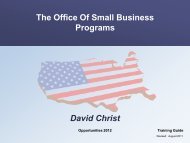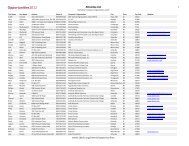Capital Opportunities for Small Businesses - sbtdc
Capital Opportunities for Small Businesses - sbtdc
Capital Opportunities for Small Businesses - sbtdc
Create successful ePaper yourself
Turn your PDF publications into a flip-book with our unique Google optimized e-Paper software.
C A P I T A L O P P O R T U N I T I E S F O R SMA L L B U S I N E S S E S<br />
A Qualified Business Venture is a business organized to engage primarily in manufacturing, processing,<br />
warehousing, wholesaling, R&D, or a service-related industry. To be eligible <strong>for</strong> registration as a<br />
qualified business venture, the business cannot have generated more than $5 million in gross revenues<br />
as of its last fiscal year. It also cannot be engaged to a substantial degree in providing professional<br />
services, contracting or construction, selling or leasing at retail, investing, entertainment, or managing<br />
real estate. The business no longer needs to have its headquarters or principal business operations in<br />
North Carolina. A Qualified Grantee Business is one that received funding or grants from certain<br />
specified sources during the preceding three years.<br />
An individual who directly purchases the equity securities or subordinated debt of a Qualified Business<br />
Venture or Qualified Grantee Business is allowed a credit equal to as much as 25 percent of the<br />
amount invested, with an annual cap of $50,000 per individual investor. Unused credits can be carried<br />
<strong>for</strong>ward <strong>for</strong> five years be<strong>for</strong>e they expire. No credit is allowed <strong>for</strong> a purchase of securities if a broker’s<br />
fee or commission is paid. A pass-through entity with less than $5 million of capital under management<br />
that purchases the securities of a Qualified Business Venture or a Qualified Grantee Business is also<br />
eligible <strong>for</strong> a tax credit of up to 25 percent of the amount invested. The aggregate amount of the tax<br />
credit allowed a pass-through in a single tax year is $750,000.<br />
The QBV tax credit has been repealed <strong>for</strong> tax years after CY 2013.<br />
North Carolina Department of the Secretary of State<br />
POB 29622<br />
Raleigh, NC 27626-0622<br />
919.733.3924<br />
www.secretary.state.nc.us/bustax/Overview.aspx<br />
Tax Credits <strong>for</strong> Growing <strong>Businesses</strong> (Article 3J tax credits)<br />
The William S. Lee Act was the cornerstone of North Carolina’s economic development legislation.<br />
Ratified by the General Assembly in 1996 to increase North Carolina’s global competitiveness, the Act<br />
had been amended numerous times. However, the law expired at the end of 2006 and was replaced by<br />
Article 3J (Tax Credits <strong>for</strong> Growing <strong>Businesses</strong>).<br />
Under the new Tax Credits <strong>for</strong> Growing <strong>Businesses</strong> (commonly referred to as Article 3J tax credits)<br />
approved by the General Assembly in the summer of 2007, the five-tier system of the William S. Lee Act<br />
has been replaced by a three-tier system. Using a statutory <strong>for</strong>mula outlined in the new law, the<br />
Department of Commerce assembles the required statistics <strong>for</strong> each of North Carolina's 100 counties,<br />
applies the <strong>for</strong>mula and assigns a tier designation ranking from one to three with Tier 1 being the most<br />
economically distressed and Tier 3 being the least. 3<br />
The rankings are based on an assessment of each county's unemployment rate, median household<br />
income, population growth and assessed property value per capita. In addition, any county with a<br />
population of less than 12,000 or a county with a population of fewer than 50,000 residents with 19<br />
72









